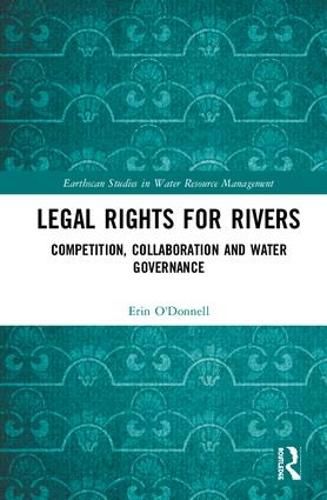Readings Newsletter
Become a Readings Member to make your shopping experience even easier.
Sign in or sign up for free!
You’re not far away from qualifying for FREE standard shipping within Australia
You’ve qualified for FREE standard shipping within Australia
The cart is loading…






In 2017 four rivers in Aotearoa New Zealand, India, and Colombia were given the status of legal persons, and there was a recent attempt to extend these rights to the Colorado River in the USA. Understanding the implications of creating legal rights for rivers is an urgent challenge for both water resource management and environmental law. Giving rivers legal rights means the law can see rivers as legal persons, thus creating new legal rights which can then be enforced. When rivers are legally people, does that encourage collaboration and partnership between humans and rivers, or establish rivers as another competitor for scarce resources?
To assess what it means to give rivers legal rights and legal personality, this book examines the form and function of environmental water managers (EWMs). These organisations have legal personality, and have been active in water resource management for over two decades. EWMs operate by acquiring water rights from irrigators in rivers where there is insufficient water to maintain ecological health. EWMs can compete with farmers for access to water, but they can also strengthen collaboration between traditionally divergent users of the aquatic environment, such as environmentalists, recreational fishers, hunters, farmers, and hydropower. This book explores how EWMs use the opportunities created by giving nature legal rights, such as the ability to participate in markets, enter contracts, hold property, and enforce those rights in court. However, examination of the EWMs unearths a crucial and unexpected paradox: giving legal rights to nature may increase its legal power, but in doing so it can weaken community support for protecting the environment in the first place. The book develops a new conceptual framework to identify the multiple constructions of the environment in law, and how these constructions can interact to generate these unexpected outcomes. It explores EWMs in the USA and Australia as examples, and assesses the implications of creating legal rights for rivers for water governance. Lessons from the EWMs, as well as early lessons from the new ‘river persons,’ show how to use the law to improve river protection and how to begin to mitigate the problems of the paradox.
$9.00 standard shipping within Australia
FREE standard shipping within Australia for orders over $100.00
Express & International shipping calculated at checkout
In 2017 four rivers in Aotearoa New Zealand, India, and Colombia were given the status of legal persons, and there was a recent attempt to extend these rights to the Colorado River in the USA. Understanding the implications of creating legal rights for rivers is an urgent challenge for both water resource management and environmental law. Giving rivers legal rights means the law can see rivers as legal persons, thus creating new legal rights which can then be enforced. When rivers are legally people, does that encourage collaboration and partnership between humans and rivers, or establish rivers as another competitor for scarce resources?
To assess what it means to give rivers legal rights and legal personality, this book examines the form and function of environmental water managers (EWMs). These organisations have legal personality, and have been active in water resource management for over two decades. EWMs operate by acquiring water rights from irrigators in rivers where there is insufficient water to maintain ecological health. EWMs can compete with farmers for access to water, but they can also strengthen collaboration between traditionally divergent users of the aquatic environment, such as environmentalists, recreational fishers, hunters, farmers, and hydropower. This book explores how EWMs use the opportunities created by giving nature legal rights, such as the ability to participate in markets, enter contracts, hold property, and enforce those rights in court. However, examination of the EWMs unearths a crucial and unexpected paradox: giving legal rights to nature may increase its legal power, but in doing so it can weaken community support for protecting the environment in the first place. The book develops a new conceptual framework to identify the multiple constructions of the environment in law, and how these constructions can interact to generate these unexpected outcomes. It explores EWMs in the USA and Australia as examples, and assesses the implications of creating legal rights for rivers for water governance. Lessons from the EWMs, as well as early lessons from the new ‘river persons,’ show how to use the law to improve river protection and how to begin to mitigate the problems of the paradox.